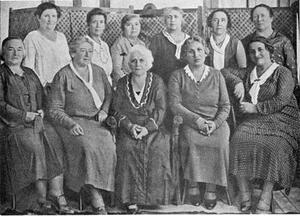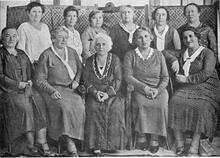Rosa Welt-Straus
Courtesy of Ha-Keren le-Ezrat ha-Isha.
Rosa Welt-Straus was a women’s rights activist who was active in the struggle for women’s suffrage in both New York and Mandatory Palestine. Born in Bukovina, Welt-Straus received her medical degree in 1878, becoming one of the first female ophthalmologists in Europe. After immigrating to New York, she joined the women’s suffrage movement and helped form the International Woman Suffrage Alliance. In 1919, Welt-Straus followed her daughter Nellie to Palestine. She was elected head of the Union of Hebrew Women within two months of her arrival and became very involved with the organization. She went on to represent the Union internationally, including at the IWSA congress in Geneva in 1920. Although she did not frequently appear publicly in Palestine, Welt-Straus is remembered as giving Jewish women activists a feeling of international interconnectedness.
Early Life, Education, & Family
Rosa Welt was born in 1856 in Chernovsty (Ger. Czernowitz; Rom. Cernauti), a city in Bukovina. She and her three sisters were educated in the classical gymnasium (high school), which enabled them to continue on to higher education. Rosa Welt studied at the Universities of Vienna and Berne, which at the time were the only places where women could study medicine. In 1878, she received her medical degree and was one of the first women in Europe to become an ophthalmologist. Two of her sisters also finished medical school and another sister became a chemist. The family moved to Geneva, Switzerland, and Rosa Welt, together with one of her sisters, immigrated to the United States, where she worked for many years as an eye surgeon in the New York eye hospital and also in the eye clinic at the Women’s Hospital. In New York, she married Louis Straus, a successful businessman. They had a daughter, Nellie (Nellie Straus-Mochenson, 1892–1933).
In addition to her professional work, Welt-Straus was active in the struggle for women’s suffrage in New York and a partner in forming the International Woman Suffrage Alliance founded by Carrie Chapman-Catt. (Jus Suffragii, 1939). In 1904, she participated in the first congress of the International Woman Suffrage Alliance as a member of the American delegation. She continued to take part in the organization’s congresses after she moved to Palestine in 1919, representing the Union of Hebrew Women for Equal Rights in Erez Israel at these assemblies.
Immigration to Palestine and Leadership of the Union of Hebrew Women
Welt Straus was drawn to Zionism by her daughter, Nellie. After her father's suicide, Nellie moved to her family in Geneva, where she studied at the university. There she met a young Zionist from Palestine, with whom she fell in love, and became a Zionist herself. When the first World War broke out, she went back to New York, met Henrietta Szold, and became a member of Hadassah. When the war was over, she moved to Palestine and her mother joined her.
Welt-Straus came to Palestine in June 1919, when she was sixty-three years old, and within two months of her arrival she was elected head of the Union of Hebrew Women, a position she filled until she left the country for Geneva after her daughter's death. The Union’s decision to elect Welt-Straus as its chairwoman so soon after her arrival indicates that the members were aware of her activities in New York. In September 1919, the newspaper Hadshot ha-Arez published a letter in which Welt-Straus wrote about American Jewish women who, together with other women, took part in the struggle for women’s right to vote in the United States and who were sure that there would be no need for such a struggle in [jwa_encyclopdia_glossary:309]Erez Israel[/jwa_encyclopdia_glossary].
[E]ven as we American women fought the battle for our rights, we often felt great pride, since this problem had been solved long ago in our own country, our national community.... We, women who lived in countries where we had full citizenship, came to the land of our forebears. We want to work and be active. . . . It is clear that only those who possess equal rights can, hand in hand, perform successful and fruitful work (Welt-Straus, 1919).
However, when she came to the country to participate in building a national home for the Jews, she discovered a different reality—one in which women had to fight for the right to vote, a long and stubborn struggle..
On the eve of her departure for Palestine, Carrie Chapman-Catt, the president of the International Woman Suffrage Alliance (IWSA), suggested to Welt-Straus that she organize the women in Palestine and have them join the Alliance. In a letter published in Jus Suffragii, the monthly publication of the IWSA, Welt-Straus responded that it had been easy to organize the women of Palestine, since upon her arrival she had discovered that women’s organizations already existed and were in the process of unification. Convinced that women in Palestine had won the right to vote a year earlier, Welt-Straus anticipated no problems (Jus Suffragii, July 1920).
International Activities
When she accepted the position of Union chairwoman, Welt-Straus, like many women, had no idea how difficult the struggle would be. Doubtless, her contacts with the American movement and the IWSA were the main reasons the women of the Union chose her to lead the organization, which had only just come into existence. Her international activity contributed a great deal to the establishment of contacts with women and organizations outside the country. In July 1920, a year after she arrived in Palestine, Welt-Straus traveled to London to participate in the assembly at which the Women’s International Zionist Organization (WIZO) was established. That same year, she represented the Union of Hebrew Women at the IWSA congress in Geneva. She participated in all the IWSA Congresses, represented the Alliance on important international committees, and was frequently included in delegations to the prime ministers of the various countries that hosted the congresses. In letters she sent to Sara Azaryahu from the International Alliance congresses, she reported on her wide-ranging activities during the assemblies, on the participants’ enthusiastic response to her proposals, and her sense of the interest and connection that the women showed for everything related to Palestine. As always in the international women’s movement, these assemblies were a source of feelings of solidarity and strength among the members, and Rosa Welt-Straus continued to participate in them and report back to her colleagues in Palestine on all her appearances and activities during the conferences.
As a veteran member of the International Alliance, Welt-Straus was a representative on the Mandates Committee in Geneva and in the coalition of nine international women’s organizations formed by the League of Nations. The goal of this coalition was to find a solution to the nationality problems of numerous women all over the world who, after emigrating, were dependent on men for citizenship in the countries in which they now lived. This problem had additional significance in Palestine since married working women could not submit a request to the British administration to bring their families to Palestine by virtue of themselves being working women, but only by virtue of their husbands’ employment. The appeal of the Union of Hebrew Women to the Mandate authorities was rejected on the grounds that, in Jewish law, a woman’s salary belongs to her husband.
Despite her status in the Union, Welt-Straus seldom appeared in Mandatory Palestine in public because she did not speak Hebrew well and felt that it was inappropriate to speak in public in a foreign language. As a result, she was not a candidate to represent the Union in the election to the Asefat ha-Nivharim (The National Assembly). This did not adversely affect her role in the organization, which she continued to chair and in the running of which she was an active participant for many years. As Sara Azaryahu’s son relates, the members viewed her as
a great treasure, since she introduced a cosmopolitan perception that the problem was that of all women in the world. And here it began with the lone woman in Haifa, and then with other women, and suddenly it turned out that women all over the world were concerned about and dealing with this same issue. Straus was not only the one who made contacts and connections but also one who brought a world perspective into the meetings. Mother [Sarah Azaryahu] always felt that she had power because she was part of such an international movement (Interview with Ornan Azaryahu , Safran, 1998).
Welt-Straus gave women a feeling of international connectedness and continued to represent the Jewish women of Palestine at international assemblies and in activity on behalf of women in Palestine.
American Jewish women also saw Welt-Straus as an important figure in the work for women’s rights in Palestine. In the opinion of Sarah Kussy, a member of Hadassah who visited Palestine in 1923, Welt-Straus was the one who organized the Union and affected its achievements. In the report she wrote for a local American newspaper, Kussy wrote:
Dr. Straus has organized the Women’s Equal Rights Association which is very influential in advancing the political status of the women in Palestine. Her work has had an influence on the formulation of the constitution of that country (Kussy, 1923).
Sarah Kussy also pointed out the importance that the struggle for suffrage would have on the laws relating to women, but in Palestine the British government had no intention of writing any sort of constitution. Yet, the Union was successful in demanding an increase in the legal age of marriage for girls; due to the Union’s pressure, Mandatory British law required that a girl be at least 15 years before she could marry.
In her final years, Welt-Straus fell ill and went to her family in Geneva, where she died at the age of 82. Upon her death on December 15, 1938, Sara Azaryahu wrote: “Her extraordinary and captivating personality, her exalted talents and wide education, enabled Dr. Welt-Straus to win a place of honor among women who headed large international organizations. She was the life and soul of the Union of Hebrew Women (Ha’aretz, 1939).” Welt-Straus’s activity in the union was undoubtedly vital and significant, as her many years as chairwoman can testify.
Conversations with Sarah Azaryahu (German), in Rome, May 20, 1923, and Paris, August 6, 1926.
Sarah Azaryahu Archives, Yad Tabenkin, 15/3/6.
Azaryahu, Sarah. The Union of Hebrew Women for Equal Rights in Eretz Israel. Haifa: 1977.
Jus Suffragii 4 (July 1920).
Ha’aretz, March 1, 1939.
Kussy, Sarah. Newark Evening News, January 25, 1923.
Minutes of the WIZO Founding Convention, November 7, 1920.
Safran, Hannah. “International Struggle, Local Victory: Rosa Welt-Straus and the Achievement of Women’s Suffrage, 1919–1926.” In Jewish Women in the Yishuv and Zionism (Hebrew), edited by Margalit Shilo, Ruth Kark and Galit Hasan-Rokem, 315–330. Jerusalem: 2001.
Safran, Hannah. Interview with Ornan (Sinai) Azaryahu, Kibbutz Yiron, August 20, 1998.
Shaarawi, Huda. Harem Years: The Memoirs of an Egyptian Feminist. New York: The Feminist Press at CUNY, 1986.
Straus-Mochenson, Nellie. Our Palestine. Tel Aviv: 1939.
Welt-Straus, Rosa. Letter to the Editor, Hadshot ha-Arez, September 29, 1919.
Shilo, Margalit. Girls of Liberty: The Struggle for Suffrage in Mandatory Palestine. Waltham, MA: Brandeis University Press, 2016.




